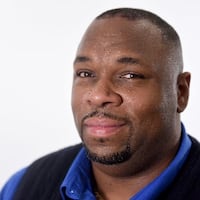Two weeks before a South Carolina school resource officer’s rough treatment of a female high school student sparked conversations about use of force, DeKalb County Schools employees began training to help avert such incidents, using mental health guidelines.
Vasanne Tinsley, director of student support for the schools, said the training will spur employees to ask questions as they interact with children: Could a student’s insubordination be a symptom of a bigger concern? Is the student a threat to himself or others?
Counselors and district police leaders already have been going through the training. School Resource officers, the police in the school hallways, will undergo training soon. DeKalb is the only area district adding training to identify markers of possible mental troubles.
“I’m a believer that education helps at all times,” Tinsley said. “The more knowledge we’re able to equip the officers with where they can actually pull from … instead of automatically thinking it’s disrespectful behavior. Instead of someone just saying you’re disrespectful, maybe they’re understanding that disrespect may be coming from a chemical imbalance, or a reaction from medication or something of that sort that absent training like this an ordinary person may not think about that.”
The training is being done by the National Board of Certified Counselors, out of Greensboro, N.C., a credentialing agency for counselors.
“They won’t be diagnosing anything,” Tinsley said, “but it brings to light some concerns out there that may be happening.” She said, “Instead of thinking it’s a child misbehaving, it may be some signs of something else that could impact the way you interact with that student.”
Areas of training include basic development, understanding diversity, stress and risk factors.
Kenneth Shore, a school psychologist based in New Jersey with more than 30 years experience in schools, said mental health training allows those dealing with children to learn a range of responses that don’t lead to extreme use of force.
“There are a range of ways dealing with kids who are insubordinate in school,” he said. “What struck me (with the South Carolina case) was the teacher quickly resorted to ‘let’s call the resource officer.’ There are a range of responses that could have been used prior to getting to that point. But teachers who don’t have access to those tools of dealing with difficult, challenging children will often quickly resort to methods that force a confrontation rather than diffuse it.”
Joyce Morley, a member of the board of education and also a trained psychologist, said she has long been an advocate for mental health training in schools because it leaves a space for adults to ask more questions before acting.
“We become so desensitized to believe every child is bad,” she said. “In the South Carolina case, all she wanted was someone to listen to her and hear her. There’s that piece of not knowing where a child is emotionally and psychologically.”
“Many (school resource officers) carry guns and many of them are not sensitive … and look at that gun as being their power and authority and they do not know how to rein it in,” she said. “We’re training them to become mental health facilitators … so they can recognize the signs and symptoms of mental illness.”
About the Author
Keep Reading
The Latest
Featured
